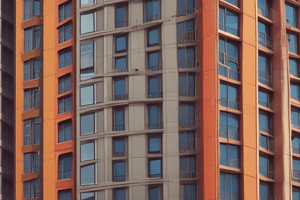Podcast
Questions and Answers
What was a primary cause of the building collapse in Shanghai?
What was a primary cause of the building collapse in Shanghai?
- Poor weather conditions
- Pressure difference on two sides of the structure (correct)
- Earthquake
- Flooding
The building in Shanghai was completed and occupied at the time of its collapse.
The building in Shanghai was completed and occupied at the time of its collapse.
False (B)
What construction error led to the foundation failure in Shanghai?
What construction error led to the foundation failure in Shanghai?
Excavation of an underground garage on one side while earth was heaped on the other.
The technique known as __________ is widely used for supporting vertical excavation near existing buildings.
The technique known as __________ is widely used for supporting vertical excavation near existing buildings.
Match the following terms with their definitions:
Match the following terms with their definitions:
What was the height of the building that collapsed in Shanghai?
What was the height of the building that collapsed in Shanghai?
Preventive measures can eliminate the chances of foundation failure entirely.
Preventive measures can eliminate the chances of foundation failure entirely.
What is a recommended preventive measure for deep excavation problems?
What is a recommended preventive measure for deep excavation problems?
What was the total cost of constructing Taipei 101?
What was the total cost of constructing Taipei 101?
The foundation of Taipei 101 is 80 meters deep.
The foundation of Taipei 101 is 80 meters deep.
In what year did the construction of Taipei 101 begin?
In what year did the construction of Taipei 101 begin?
Each pile of the foundation can withstand a load of ______ tons.
Each pile of the foundation can withstand a load of ______ tons.
Match the foundation construction methods with their descriptions:
Match the foundation construction methods with their descriptions:
The foundation of Taipei 101 is supported by 280 piles.
The foundation of Taipei 101 is supported by 280 piles.
What type of soil is typically found 40-50m below the surface near Taipei 101?
What type of soil is typically found 40-50m below the surface near Taipei 101?
Construction of Taipei 101 finished in ______.
Construction of Taipei 101 finished in ______.
What factor increases non-linearly with the height of a high-rise building?
What factor increases non-linearly with the height of a high-rise building?
Cyclic loading does not impact foundation capacity of high-rise buildings.
Cyclic loading does not impact foundation capacity of high-rise buildings.
What is the height of Taipei 101 in meters?
What is the height of Taipei 101 in meters?
The building aspect ratio of Taipei 101 is about ______, based on its waist.
The building aspect ratio of Taipei 101 is about ______, based on its waist.
Match the structural system with its description:
Match the structural system with its description:
What additional forces are induced on a structure due to seismic action?
What additional forces are induced on a structure due to seismic action?
How many stories does Taipei 101 have?
How many stories does Taipei 101 have?
High-rise buildings should have controlled differential settlements between high-rise and low-rise portions.
High-rise buildings should have controlled differential settlements between high-rise and low-rise portions.
Which factor does NOT influence the type of foundation selected for a tall building?
Which factor does NOT influence the type of foundation selected for a tall building?
Increasing the depth of a foundation can improve soil bearing capacity.
Increasing the depth of a foundation can improve soil bearing capacity.
What is one disadvantage of using traditional piling methods?
What is one disadvantage of using traditional piling methods?
Micropiles are constructed using __________ to fill the gap between the pile and the earth.
Micropiles are constructed using __________ to fill the gap between the pile and the earth.
Match the following methods for improving soil bearing capacity with their descriptions:
Match the following methods for improving soil bearing capacity with their descriptions:
Which method does NOT rely on hammering?
Which method does NOT rely on hammering?
Access for construction equipment is an important consideration when selecting a foundation type.
Access for construction equipment is an important consideration when selecting a foundation type.
Name one reason why traditional piling techniques might be restricted in residential areas.
Name one reason why traditional piling techniques might be restricted in residential areas.
Which of the following is a primary feature of micropile construction?
Which of the following is a primary feature of micropile construction?
Micropiles can achieve maximum axial load capacities of up to 2000 kN.
Micropiles can achieve maximum axial load capacities of up to 2000 kN.
What are helical piles also known as?
What are helical piles also known as?
Micropiles can be installed through existing ______.
Micropiles can be installed through existing ______.
Match the micropile features with their descriptions:
Match the micropile features with their descriptions:
What is one major benefit of screw piles in terms of environmental impact?
What is one major benefit of screw piles in terms of environmental impact?
Steel casing is the only form of reinforcement used in micropiles.
Steel casing is the only form of reinforcement used in micropiles.
What method do helical piles use to penetrate the ground?
What method do helical piles use to penetrate the ground?
Study Notes
Problems Related to High Rise Buildings
- High-rise buildings experience significant vertical loads due to their substantial weight, requiring careful consideration of ultimate bearing capacity and potential settlement.
- Differential settlements between high-rise and low-rise structures must be controlled, as high-rise buildings often sit atop smaller podiums.
- Wind-induced lateral forces lead to high moments on foundation systems, increasing vertical loads, particularly on outer piles.
- Structural design for piles must account for the combined effects of lateral forces and increased vertical loads from wind moments.
- Cyclic nature of wind loading necessitates consideration of its impact on foundation performance, as cyclic loading can degrade capacity and amplify movements.
- Seismic actions introduce additional lateral forces and ground motions, further complicating foundation design.
Case Study: Taipei 101
- Taipei 101 was the tallest building globally from 2004 to 2010, standing at 508 meters with 101 stories.
- Construction spanned from 1999 to 2004, with a total cost of $1.8 billion.
- Features include a five-story deep basement, 61 elevators, and a building aspect ratio of approximately 9 based on its waist.
- The structure is supported by a central braced core, large perimeter mega-columns, and outrigger trusses for stability against lateral forces.
- The foundation includes a slurry wall system and 380 reinforced concrete piles driven 262 feet into the ground, each capable of bearing 1,100-1,450 tons.
Foundation Details of Taipei 101
- The foundation is considered one of the most stable ever constructed, with piles measuring 5 feet in diameter and withstanding up to 2.9 million pounds.
- The foundation depth is approximately 80 meters, effectively supporting the tower's load.
Causes of Foundation Failures
- Common reasons include load transfer failures, collapsible soils, lateral loads, construction errors, unequal support, earthquakes, vibrations, landslides, and uplift failures.
Case Study: Shanghai Collapse
- A 13-story unoccupied building in Shanghai collapsed during construction due to improper methods, leading to one fatality.
- The collapse was attributed to uneven pressure from excavation on one side, causing structural instability.
Technology Advancement for Foundations
- Factors influencing foundation type include structure location, load distributions, ground conditions, construction access, durability, and local practices.
- Soil bearing capacity improvement methods include increasing foundation depth, soil compaction, drainage, confinement, grouting, and chemical treatment.
- Disadvantages of traditional piling include noise and vibrations, making them unsuitable near sensitive sites, leading to the adoption of micropiling or helical piling techniques.
Micropiles
- Micropiles are small-diameter piles installed with minimal disturbance, capable of achieving axial load capacities up to 2,000 kN.
- Their installation can occur in limited headroom areas, minimizing impacts on adjacent structures and soil.
- Versatile use includes soil reinforcement and horizontal load resistance for varying ground conditions.
Helical Piles
- Helical piles, or screw piles, have spiral blades allowing them to be drilled into the ground with minimal site disruption.
- Used for structural support and underpinning foundations, they are sustainable options as they can be moved and reused with less environmental damage compared to traditional methods.
Studying That Suits You
Use AI to generate personalized quizzes and flashcards to suit your learning preferences.
Related Documents
Description
Explore the complex dynamics of high-rise buildings in response to wind-induced forces and structural foundations. This quiz delves into the considerations of building weight, vertical loads, and the impact of surrounding low-rise structures on foundational support. Gain insights into the engineering principles necessary for designing resilient towering structures.




